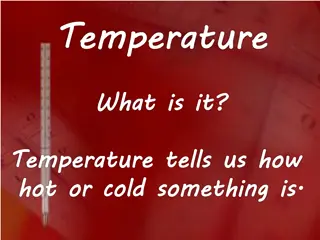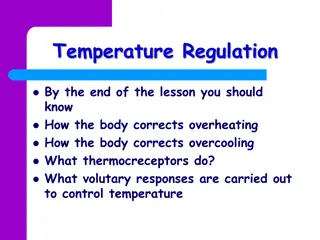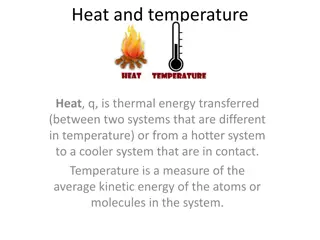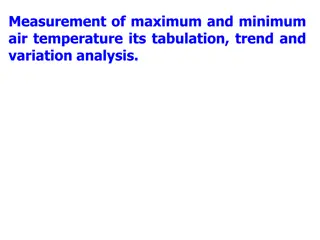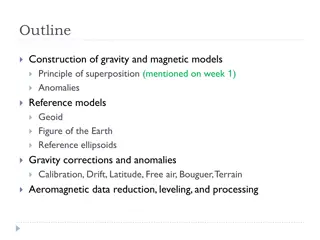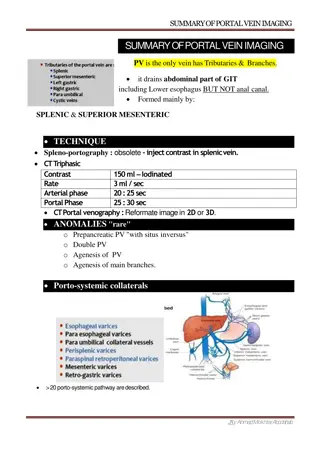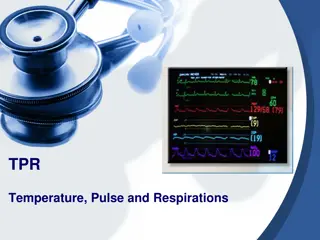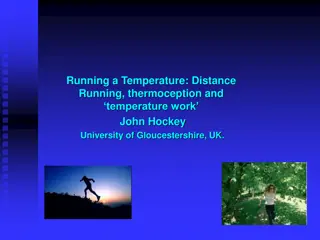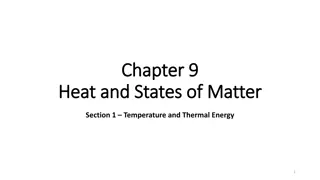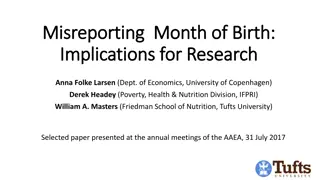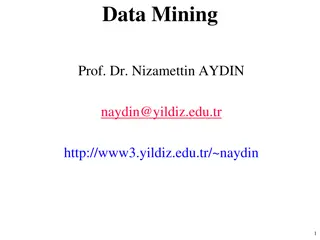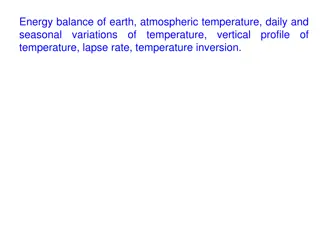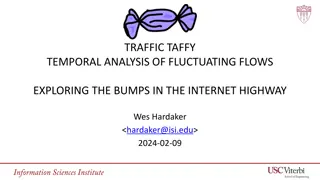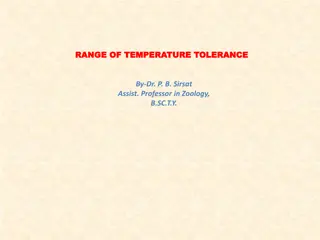Radar Attenuation Tomography for Mapping Englacial Temperature Distributions
Radar Attenuation Tomography is used to map the temperature distributions within the ice sheet by analyzing the radio waves' attenuation properties. This study focuses on the Eastern Shear Margin of Thwaites Glacier, where fast-moving ice meets slower ice, impacting ice rheology influenced by temper
4 views • 18 slides
Understanding Gravitational Anomalies and Interpretation Challenges
Gravitational anomalies pose an inverse problem in determining characteristics of underlying bodies. Surface gravity values provide insights into geometric shape, dimensions, density contrast, and depth. Interpreting anomalies requires integrating gravimetric analysis with other geological data. Cal
5 views • 62 slides
Understanding Temperature Distribution and Differences in Heat
Explore the distribution of temperature across latitudes and elevations, and learn about the difference between heat and temperature. From horizontal to vertical variations, discover how factors like latitude influence temperature distribution patterns globally. Gain insights into the fundamental co
11 views • 19 slides
Anomalies in Particle Physics: Discoveries and Implications
Explore the intriguing anomalies in particle physics discussed by Andreas Crivellin, shedding light on phenomena like the anomalous magnetic moment of the muon, X17 particle, and neutrino anomalies. Discover the latest research findings and potential implications for the future of physics.
2 views • 42 slides
Case Study: VACTERL Association in a Newborn Female with Imperforate Anus
Newborn female with VACTERL association, imperforate anus, and perianal skin tag identified at birth. Patient transferred for surgical intervention and further workup due to associated abnormalities. Imaging studies show multiple sacral vertebral anomalies. Differential diagnosis includes genetic sy
0 views • 16 slides
Margaret Hackett Family Program Overview for CNS Anomalies
The Margaret Hackett Family Program at UChicago Medicine is dedicated to advancing care and research for patients with congenital anomalies of the central nervous system. Through pillars focused on providing compassionate care, establishing a network of experts, creating resources for navigating tre
2 views • 19 slides
Exploring Temperature: Facts, Measurement, and Scales
Understanding temperature is crucial in daily life. This content delves into the definition, measurement, and scales of temperature, highlighting key facts such as body temperature, freezing and boiling points of water, and extreme temperatures like those found in lightning and the sun. Discover how
1 views • 9 slides
Understanding Temperature Effects on Donor and Acceptor Ionization in Semiconductors
Temperature plays a crucial role in the ionization of donor and acceptor atoms in semiconductors. In N-type semiconductors, the Fermi level lies below the conduction band, while in P-type semiconductors it lies above the valence band, with the position depending on temperature and impurity atoms. Do
1 views • 13 slides
Understanding Body Temperature Regulation
Explore how the body maintains its internal temperature through mechanisms such as correcting overheating and overcooling, the role of thermoreceptors, and voluntary responses that help control temperature. Discover the importance of regulating internal body temperature for optimal enzyme-catalyzed
2 views • 18 slides
Understanding Anomalies in Law and Ways to Rectify Them
This presentation sheds light on the anomalies in W.P. Land Revenue Rules, 1968 and HCROs, discussing their formation, effects, and types. It explores how anomalies in law impact justice, highlighting reasons behind their development and probable forms. The content emphasizes the importance of addre
6 views • 18 slides
Understanding Heat and Temperature in Thermodynamics
Thermal energy transfer, heat, and temperature play crucial roles in determining the behavior of systems in terms of kinetic energy and molecular motion. The zeroth law of thermodynamics establishes the relationship between heat and temperature. Heat transfer leads to changes in the average kinetic
8 views • 8 slides
Understanding Anorectal Malformations in Pediatric Surgery
Anorectal malformations are congenital abnormalities involving the development of the anal canal and sphincter muscles. They may present with imperforate anus, fistulous connections, or rectal atresia. Classification in males and females helps in determining the types of surgical treatments required
0 views • 15 slides
Understanding Temperature Measurement in Plant Growth
Exploring the measurement of maximum and minimum air temperature, its significance in analyzing trends and variations, and how temperature impacts plant growth stages. The optimal temperature ranges for different plant species and the importance of maximum and minimum temperature recordings using sp
0 views • 20 slides
Anomalies of Kidneys and Factors Affecting Renal Function in Veterinary Pathology
An overview of anomalies affecting the kidneys in animals, including ectopic kidney location, renal agenesis, renal aplasia, and renal hypoplasia. The images illustrate anomalies such as fused kidneys and duplication of kidneys, with explanations of occurrence and sequelae. Additionally, factors aff
0 views • 13 slides
Unveiling Dark Matter: An Exploration Beyond the Standard Model
Delve into the intriguing realm of dark matter through observed anomalies, a new theory introduction, and collider signatures. Uncover evidence of dark matter's existence through phenomena such as the bullet cluster, weak gravitational lensing, and unexplained astrophysics anomalies. Join the quest
2 views • 43 slides
Understanding Gravity and Magnetic Models in Geophysics
Construction of gravity and magnetic models involves principles of superposition to isolate anomalies, reference ellipsoids, geoid, and various corrections like drift, latitude, free air, Bouguer, and terrain corrections. Gravity anomalies are determined by subtracting multiple factors from observed
0 views • 15 slides
Understanding Consistency at Facebook: A Study on Existential Consistency
This study explores the measurement and comprehension of consistency at Facebook, focusing on existential consistency. Key topics covered include consistency performance, fundamental tension between consistency and performance, anomalies in Facebook systems, and strategies for quantifying and preven
0 views • 30 slides
Portal Vein Imaging Techniques and Anomalies Overview
Portal vein imaging is crucial for evaluating conditions affecting the abdominal part of the gastrointestinal tract. Techniques such as spleno-portography and CT triphasic contrast imaging are used to visualize the portal vein and diagnose anomalies like portal-systemic collaterals and porto-systemi
4 views • 7 slides
On-Orbit Anomaly Research at NASA: Causes and Solutions
On-Orbit Anomaly Research (OOAR) at NASA's IV&V Facility involves studying mishaps related to space missions, identifying anomalies, and improving IV&V processes. The research delves into the causes of anomalies, such as operating system faults, and proximate causes like software deficiencies. Detai
0 views • 20 slides
Understanding Chromosomal Anomalies in Human Genetics
This lecture covers essential topics in human genetics, focusing on mitosis, meiosis, and chromosomal abnormalities. Students will learn about the events in mitosis and meiosis, non-disjunction, and classification of chromosomal anomalies, including numerical and structural abnormalities. Detailed e
1 views • 22 slides
Understanding Temperature Measurement in Healthcare
Temperature, Pulse, and Respirations are vital signs used to assess a patient's health. Temperature can be measured through various methods such as oral, rectal, axillary, tympanic, and temporal routes using different types of thermometers. It's important to know the normal temperature ranges for di
3 views • 39 slides
The Phenomenology of Temperature Awareness in Distance Running
Researchers at the University of Gloucestershire explore the embodied consciousness of distance runners, focusing on thermoception and temperature regulation. Utilizing sociological phenomenology and phenomenological ethnography, the study delves into the sensory experiences of runners, emphasizing
0 views • 29 slides
Exploring Temperature: From Touch to Thermometer
Explore the concept of temperature in Year 4 lesson 1, understanding that touch is not always accurate in judging temperature. Engage in activities to test different temperatures and discover the limitations of using the sense of touch. Lesson 2 introduces using a thermometer to measure temperature
0 views • 43 slides
Exploring Polydactyly and Syndactyly: Genetic Anomalies in Limb Development
Polydactyly is a condition characterized by the presence of more than five fingers or toes on a hand or foot, often associated with genetic disorders. This study delves into the types, patterns, associated anomalies, treatment plans, and outcomes related to polydactyly. Syndactyly, on the other hand
0 views • 23 slides
Topological Quintessence: Anomalous Cosmic Anisotropies and Dark Flow Directions
The consistency of Cold Dark Matter (CDM) with observational data has improved over the past decade, but tensions remain with various cosmic anomalies such as preferred anisotropy axes and dark flow directions. Topological Quintessence, a physical mechanism proposed by L. Perivolaropoulos and collab
0 views • 26 slides
Comprehensive Solution for EU Digital COVID Certificate Verification
This solution offers face recognition, temperature monitoring, and verification of EU Digital COVID Certificates for personnel. It includes products like DHI-ASI7213X-V1-T1 and ASF172X-T1, with various unlocking modes and support for certificate verification. The system allows for accurate and fast
0 views • 7 slides
Understanding Heat, Temperature, and States of Matter
Exploring the concepts of heat and temperature in relation to the kinetic theory of matter, this content delves into the difference between heat and temperature, the kinetic energy of particles, temperature scales, thermal energy, and specific heat. It also provides formulas for temperature conversi
0 views • 10 slides
Exploring Anomalies in Realistic Global Flows Using Matrix Physics
Investigate how matrix physics can provide a novel approach in understanding global climate models, focusing on realistic global flows and anomalies. The study aims to move beyond traditional algorithmic rule sets, examining how deviations from time mean flows can affect climate and weather patterns
0 views • 35 slides
Low Temperature Thermometry Overview
Temperature measurement, known as thermometry, involves assessing local temperature levels for various applications. A good low-temperature thermometer should offer reproducibility, high sensitivity, and a wide operating range. Primary thermometers directly measure properties of matter, while second
0 views • 25 slides
Understanding Temperature Measurement in Mechanical Engineering
Exploring the concepts of temperature measurement in mechanical engineering, this article covers topics such as temperature scales, the ideal-gas thermometer, and the relationship between temperature and heat. With detailed explanations and visual aids, it provides insights into how temperature is m
0 views • 25 slides
Understanding Temperature Measurement with Thermometers
Explore the principles of temperature measurement through thermometers, understanding phase changes, behavior of gases, and creating temperature scales. Compare weather forecasts between Moscow and Washington, discussing which city will be warmer and predicting precipitation types. Dive into discuss
0 views • 14 slides
Developing a Food Temperature Probe with BBC micro:bit
Design and develop a programmable system using the BBC micro:bit to create a prototype food temperature probe. The system should include a temperature sensor to detect food temperature, a buzzer to sound a warning if the food is too cold, and an LED screen to display the food temperature. Follow the
0 views • 9 slides
Understanding Misreporting of Month of Birth in Research
Researchers discuss the implications of misreporting the month of birth in studies on how exposure to agro-environmental and other shocks in early life affects lifelong health outcomes. They analyze patterns of seasonality and anomalies in reported birth months, highlighting the impact on child grow
0 views • 15 slides
Understanding Anomaly Detection in Data Mining
Anomaly detection is a crucial aspect of data mining, involving the identification of data points significantly different from the rest. This process is essential in various fields, as anomalies can indicate important insights or errors in the data. The content covers the characteristics of anomaly
0 views • 50 slides
Anomaly Detection in Data Mining: Understanding Outliers and Importance
Anomaly detection is crucial in data mining to identify data points significantly different from the norm. This technique helps in recognizing rare occurrences like ozone depletion anomalies. Understanding the distinction between noise and anomalies is key, as anomalies can provide valuable insights
0 views • 35 slides
Detecting Performance Anomalies in Cellular Networks via Regression Analysis
The study focuses on detecting performance anomalies in cellular networks using regression analysis. It addresses challenges such as labeling, rare anomalies, and correlated factors. The tool CellPAD is introduced for anomaly detection, supporting various prediction algorithms and offering insights
0 views • 19 slides
Understanding Earth's Energy Balance and Temperature Variations
Earth's energy balance is crucial for maintaining atmospheric temperature and regulating daily and seasonal temperature changes. The net radiation, consisting of incoming shortwave and outgoing longwave radiation, plays a key role in this balance. Components such as sensible heat flux, latent heat o
0 views • 18 slides
Exploring Traffic Anomalies with Traffic Taffy: Network Operators' Challenges
Discover how network operators tackle odd anomalies in internet traffic with Traffic Taffy, a tool that aids in temporal analysis of fluctuating flows. Current solutions and specific problem spaces are discussed, alongside insights for comparing anomalies against baselines and defining the problem s
0 views • 24 slides
Understanding Body Temperature Regulation and Factors Affecting It
Body temperature regulation is a complex process involving the balance of heat production and loss. Factors like age, hormones, stress, and environmental changes can influence body temperature. Heat production is affected by factors such as basal metabolic rate, muscle activity, fever, and sympathet
0 views • 24 slides
Temperature Tolerance of Organisms in the Universe
Life on Earth exists within a range of temperatures, with organisms displaying varied temperature tolerance. Eurythermal organisms can withstand large temperature fluctuations, while stenothermal organisms tolerate only small variations. The temperature range for each species is crucial for their ph
0 views • 8 slides






